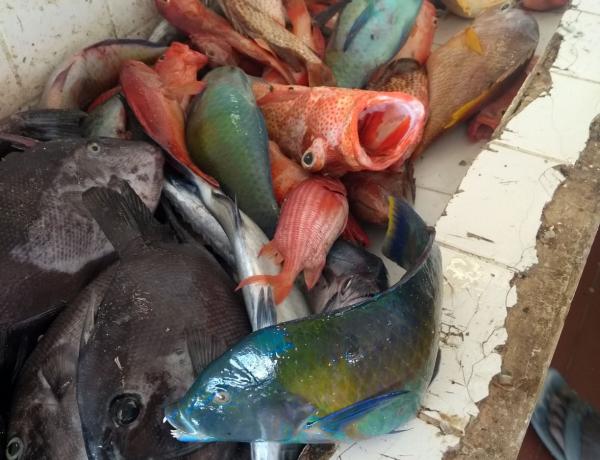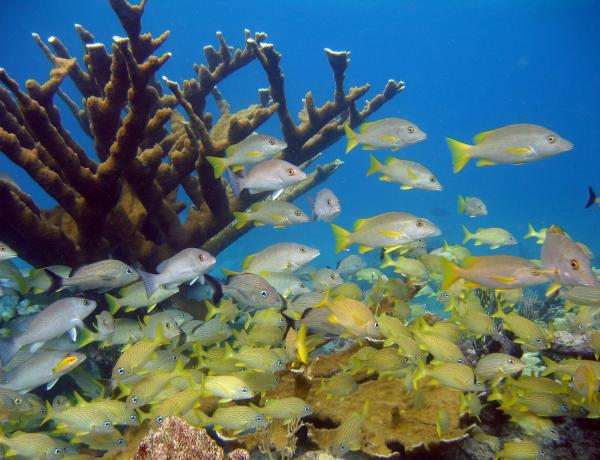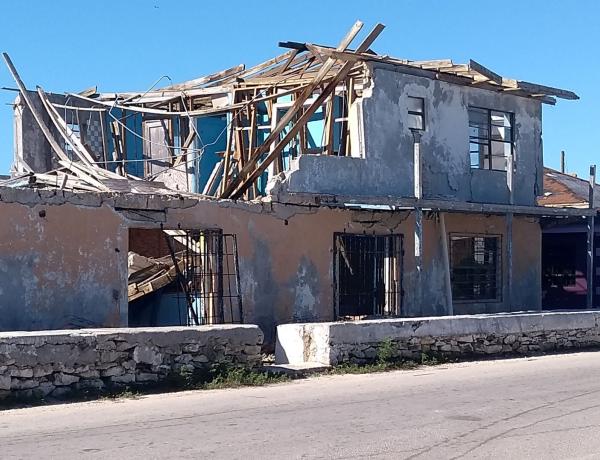There are six UK Overseas Territories in the Caribbean and Mid-Atlantic.
They are diverse in size, economic and social development, and systems of governance and are small territories with populations ranging from approximately 5,000 people in Montserrat to 65,000 in both Bermuda and the Cayman Islands. The total population is estimated at 220,000 spread across the islands of Anguilla, Bermuda, the British Virgin Islands, the Cayman Islands, Montserrat, and the Turks and Caicos.
The marine and coastal environment is an important natural resource to these UKOTs, with economies and people heavily dependent on the services they provide (e.g., fisheries and tourism). Climate change is already affecting these islands, through loss of habitat and degradation of biodiversity, and the social and economic impacts caused by extreme weather events.
Sea-level rise and changes in the frequency and/or intensity of extreme weather events (heatwaves, extreme temperature and heavy precipitation, tropical cyclones, storm surges, and coastal, river and rain-induced flooding) constitute the biggest climate change risks to the islands. The economic and social impacts of extreme weather events on Caribbean and Mid-Atlantic UKOTs are of national significance. For example, Hurricanes Irma and Maria in 2017 were some of the most intense storms recorded in the region and caused widespread devastation across the UKOTs of Anguilla, the British Virgin Islands and the Turks and Caicos Islands.
In the marine environment, sea temperature rise is a major threat to habitats and species, most notably when marine heatwaves hit coral reefs causing bleaching and impacting on the ecosystem condition and function of the area. Some marine species have shifted their geographic ranges, seasonal activities, migration patterns, abundances and interactions, with important consequences for fisheries and the provision of other ecosystem services. As temperatures continue to rise, further major impacts on marine ecosystems are to be expected in the future.
These climate change impacts are exacerbated by other human activities, such as coastal development, the effects of which combine to diminish the resilience of ecosystems to adapt to those changing conditions.
From an initial long-list of impacts on biodiversity and society for this region, three priority climate change issues were identified by a regional working group of scientific experts and policymakers:
Regional and national initiatives are guided by the CARICOM Regional Framework for Achieving Development Resilient to Climate Change (the Regional Framework 2009 - 2015 and its revision in 2021), which was endorsed by CARICOM Heads of Government in 2009 to chart the region’s path towards building resilience to the impacts of climate change and which embeds nature-based solutions as actions to be pursued. Although there is much more work to be done, there have been several initiatives aimed at building resilience that incorporate nature-based solutions.
Recognising the importance of tourism across theregion, including these UKOTs, The CARIBSAVE Climate Change Risk Atlas (CCRA) project employs an evidence-based, inter-sectoral approach to examine vulnerability and adaptive capacity. The outcomes will help to maintain a sustainable tourism industry in the face of a changing climate.
There are also national examples of emerging adaptation initiatives. Some of the governments of the region have developed national climate change policies and plans, low carbon development strategies, trust funds such as that of the BVI, and tools aimed at evaluating the climate influences on development activities such as the Caribbean Community Climate Change Centre (CCCCC) developed Caribbean Climate On-line Risk and Adaptation tooL (CCORAL).
Climate change presents significant risks for Caribbean and Mid-Atlantic OTs and there is a need for substantial climate action to reduce vulnerability and exposure. All the OTs have either begun development of, or approved climate change policies with the aim of achieving low-carbon and climate resilient development objectives. Across these policies, the importance of mainstreaming climate change into all government strategies, spending and investment decisions is highlighted.
There have been few sector-specific policies or assessments. In Anguilla and Montserrat, a fisheries focused vulnerability assessment identified the need for a management approach that considers multiple climate change impacts along with other pressures that stem from coastal development, resource overuse, pollution, and invasive species fisheries.
The paucity or unavailability of data demands greater action on research into the impacts of climate change in the UKOTs and the generation of data and information to support evidence-based decision-making.
Please cite this information as Murray, P. A., Nichols, K.E., Thomas, A., Lockhart, K., O’Garro, M. McCoy, C., and Austin, T., Eds. Howes, E.L. and Buckley, P. (2021) Summary - key climate change effects on the coastal and marine environment around the Caribbean and Mid-Atlantic UK Overseas Territories. MCCIP Science Report Card 2021.
MCCIP wishes to acknowledge the contributions of Ajhermae White (Foreign Commonwealth and Development Office), Stephen Mendes (Montserrat Government) and Hannah Jallouli-White (FCDO), who helped to identify the priority climate change issues at the Regional Workshop.


